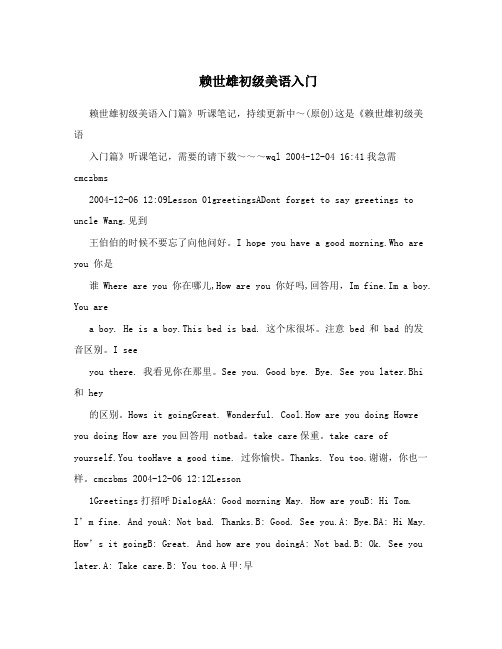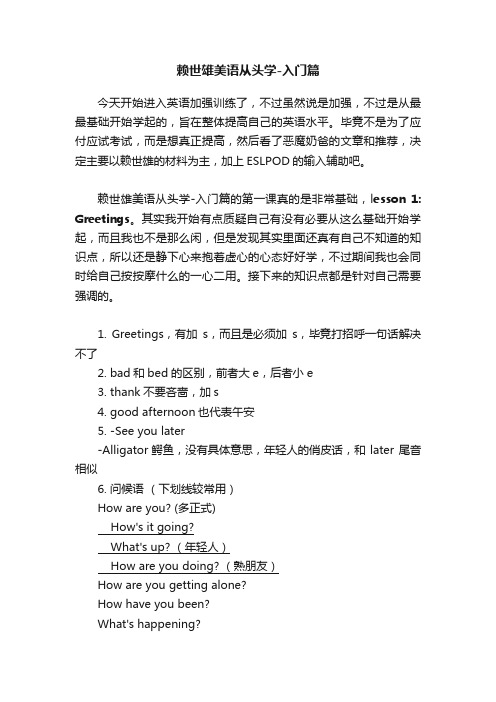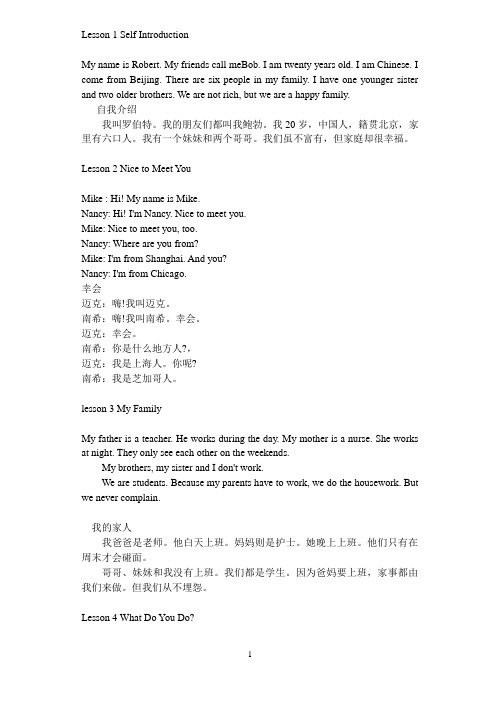赖世雄美语从头学-初级篇(上)
赖世雄零起点英语1(入门篇)

读书笔记模板
01 思维导图
03 读书笔记 05 目录分析
目录
02 内容摘要 04 精彩摘录 06 作者介绍
思维导图
关键字分析思维导图
老师
爱好
入门篇
知识
零起点
时间
宾语
零起点
语法
英语 副词
疑问
赖世雄
活用
信
进行时
名词
动词
笔友
内容摘要
很多人想学好英语,却总是事与愿违,其实不是我们学不好,而是英语基础不够扎实。
贴身家教,不出国也能把英语学得棒棒的!
《赖世雄零起点英语》系列由赖世雄老师和吴纪维老师精心编写,
常青藤英语团队细心编辑加工,一共三册,以美语为主,共230课,依次分为入门篇、基础篇、进阶篇。零起点1
是零散的基础语法知识点的介绍,2和3慢慢介入课文的形式,通过文章语境的实例运用进一步巩固前附的语法知
识。是一套由浅入深、循序渐进、图文并茂、内容实用的英语教程,配合讲解音频,句句干货,让学习扎实又有
every day是时间副词,表示“每一天”,是两个词,可以置于句尾或句首;everyday是形容词,表示“每 天的”,是一个词,之后一定要加名词。
字尾如果是t或d时,若与后面的词没有连读,则该t或d要消音。如Paul and David中and的d要消音。
here表示“这里”;there表示“那里”。两者之前都可以接over,用来强调语气,表示“就在”。
Lesson 25 活用 特殊疑问句及一般
问句
Lesson 27 时刻 的说法1
Lesson 28 时刻的 说法2
Lesson 29 活用时 间名词
Lesson 30 介绍现 在进行时
赖世雄初级美语入门

赖世雄初级美语入门赖世雄初级美语入门篇》听课笔记,持续更新中~(原创)这是《赖世雄初级美语入门篇》听课笔记,需要的请下载~~~wql 2004-12-04 16:41我急需cmczbms2004-12-06 12:09Lesson 01greetingsADont forget to say greetings to uncle Wang.见到王伯伯的时候不要忘了向他问好。
I hope you have a good morning.Who are you 你是谁Where are you 你在哪儿,How are you 你好吗,回答用,Im fine.Im a boy. You area boy. He is a boy.This bed is bad. 这个床很坏。
注意 bed 和 bad 的发音区别。
I seeyou there. 我看见你在那里。
See you. Good bye. Bye. See you later.Bhi 和 hey的区别。
Hows it goingGreat. Wonderful. Cool.How are you doing Howre you doing How are you回答用 notbad。
take care保重。
take care of yourself.You tooHave a good time. 过你愉快。
Thanks. You too.谢谢,你也一样。
cmczbms 2004-12-06 12:12Lesson1Greetings打招呼DialogAA: Good morning May. How are youB: Hi Tom.I’m fine. And youA: Not bad. Thanks.B: Good. Se e you.A: Bye.BA: Hi May. How’s it goingB: Great. And how are you doingA: Not bad.B: Ok. See you later.A: Take care.B: You too.A甲:早啊,小梅。
(完整word版)赖世雄美语从头学-初级篇(上)

赖世雄美语从头学-初级篇(上)1. people表示“人们”时,只做复数用。
我们可以说two people , three people , many people等,却不可以说one people。
若欲表示“一个人”时,应说one person或a person2. 不完全及物动词:即接复合宾语动词,其后不仅跟一个宾语,同时需要一个宾语补足语,用来说明宾语的特点。
Call作为不完全及物动词they (主语)call(谓语) the girl(宾语) marry(宾语补足语)3. 在以下例句中old可以用of age代替:He is twenty years old = He is twenty years of age4. looks young for one’s age = look younger than one really isYou look young for your age = you look younger than you really are你看起来比实际年龄要轻5. See:看见,和…见面:I see my friends on the weekends我在周末和朋友见面6. During the day在白天,at night在晚上,以上两个短语做对称用法时,亦可以用by day和by night取代:John sleeps during the day and works at night = John sleeps by day and works by night7. Each other表示两者的“彼此”的意思,在句中只作宾语,句中的主语必须限定为两者;one other表示三者或三者以上的“彼此”,在句中只作宾语,句中的主语必须为三者或三者以上的人物。
8. The wangs = the wang family王氏一家人9. Same相同的,在使用本单词时,之前一定要置定冠词the10. Have做及物动词表示“有”的意思,使用have时,主语一定要是表示“人或者动物”的名词或代词:John has a dog they have many friendsThere be 也表示“有”的意思,但用法与have不同:In the room has a boy(in the room是表示场所的短语,不能做主语,使用时应于句首置there be,然后置名词,在将表示场所的短语置于句尾),改成there is a boy in the room11. Also与too均为副词,表示“也”的意思。
赖世雄美语从头学-入门篇

赖世雄美语从头学-入门篇今天开始进入英语加强训练了,不过虽然说是加强,不过是从最最基础开始学起的,旨在整体提高自己的英语水平。
毕竟不是为了应付应试考试,而是想真正提高,然后看了恶魔奶爸的文章和推荐,决定主要以赖世雄的材料为主,加上ESLPOD的输入辅助吧。
赖世雄美语从头学-入门篇的第一课真的是非常基础,lesson 1: Greetings。
其实我开始有点质疑自己有没有必要从这么基础开始学起,而且我也不是那么闲,但是发现其实里面还真有自己不知道的知识点,所以还是静下心来抱着虚心的心态好好学,不过期间我也会同时给自己按按摩什么的一心二用。
接下来的知识点都是针对自己需要强调的。
1. Greetings,有加s,而且是必须加s,毕竟打招呼一句话解决不了2. bad和bed的区别,前者大e,后者小e3. thank不要吝啬,加s4. good afternoon也代表午安5. -See you later-Alligator 鳄鱼,没有具体意思,年轻人的俏皮话,和later尾音相似6. 问候语(下划线较常用)How are you? (多正式)How's it going?What's up? (年轻人)How are you doing? (熟朋友)How are you getting alone?How have you been?What's happening?7. 问候答句区别a. 都有youHow are you?=How are you doing?=How are you getting alone?answer:I'm fine, thank you. (跟fine有关的回答持保留意见,比较多说法是一般不用fine这种回答,我个人听到最多的就是good) Fine, thanks.Great, thanks.Not bad, thanks.So-so, thank you.b. How have you been?这个问法是完成时,所以不能用amanswer:I have been fine, thank you.Fine, thank you.c. How's it going?answer: Not bad, thank you.So-so, thank you.Great, thank you.Fine, thank you.d. What's up/What's happening?answer: Nothing much.Same as usual.8. 感谢Thanks a lot. (非正式)Thanks a million (俏皮话)Lesson 2 Courtesy (礼貌)Idiom: Courtesy costs nothing. 礼貌不花钱;礼多人不怪。
赖世雄初级美语(全)

Lesson 1 Self IntroductionMy name is Robert. My friends call meBob. I am twenty years old. I am Chinese. I come from Beijing. There are six people in my family. I have one younger sister and two older brothers. We are not rich, but we are a happy family.自我介绍我叫罗伯特。
我的朋友们都叫我鲍勃。
我20岁,中国人,籍贯北京,家里有六口人。
我有一个妹妹和两个哥哥。
我们虽不富有,但家庭却很幸福。
Lesson 2 Nice to Meet YouMike : Hi! My name is Mike.Nancy: Hi! I'm Nancy. Nice to meet you.Mike: Nice to meet you, too.Nancy: Where are you from?Mike: I'm from Shanghai. And you?Nancy: I'm from Chicago.幸会迈克:嗨!我叫迈克。
南希:嗨!我叫南希。
幸会。
迈克:幸会。
南希:你是什么地方人?,迈克:我是上海人。
你呢?南希:我是芝加哥人。
lesson 3 My FamilyMy father is a teacher. He works during the day. My mother is a nurse. She works at night. They only see each other on the weekends.My brothers, my sister and I don't work.We are students. Because my parents have to work, we do the housework. But we never complain.我的家人我爸爸是老师。
赖世雄旅游口语从头学

旅游口语从头学Chapter 1 行前事宜第一讲:计划旅行Planning a Trip计划旅行Tom: I am going to visit the Netherlands alone.Jane: Alone?Tom: Yes, I prefer DIY traveling to package tours.Jane: What are you planning to do during your stay there?Tom: Just tour around the city by bicycle.Jane: That sounds cool. How much is your budget?Tom: I'm not going to spend too much money on accommodation.Jane: Then maybe you could stay at a hostel like many backpackers do. Tom: What a good idea!汤姆:我打算独自去荷兰游玩。
简:独自一人?汤姆:是的,比起组团游我更喜欢自助旅行。
简:你打算在那里做什么?汤姆:骑车游览那座城市。
简:这听起来很酷。
你的预算是多少?汤姆:我不打算在住宿方面花太多钱。
简: 那么也许你可以像那些背包客一样,住在青年旅社。
汤姆:好主意!第二讲:咨询旅游信息Asking about Travel InformationSam: Hey, Nick I'm going to visit Thailand. You have been there before,right? Nick: Yes, do you want some suggestions?Sam: Yes.Nick: It's better to go to the seaside but try to avoid the peak season. Sam: I see. I don't want to be one of the dumplings boiling in the sea. Nick: That's what I said. Don't forget to have your room booked in advance. Sam: Of course.Nick: Be careful of the girls you meet at the pub.Sam: Why? Is it because they are gorgeous and dangerous?Nick: There is a chance that the girl you are kissing might be a guy.山姆:嘿,尼克。
赖世雄精准美国英语发音指南01

第一章字母的读法一。
就发音而言,字母是音标的基础。
字母念不好,音标发音一定不会准确。
因此,练就标准的字母发音是精通英语发音的第一步。
二。
什么人应该学习字母的发音呢?1.初学英语的人这种人由于没被错误的发音所“污染”,只要模仿正确的音源,配合本书所列的正确学习方法,短时间就可练好字正腔圆的英语发音。
2.学习英语有一段时间,但念下列字母时,发音类似所列的汉语拼音或汉字的发音者:英文字母C G N W汉语拼音xi ji en da bu liu汉字西鸡恩大不溜*以上字母中:C应念成类似“si ”的发音G应念成类似“zhi”的发音N则是“也”的尾音再加上“ en”的发音组合而成W原是两个“U”组合而成的字母,故应念成“ doouble U”(de bou you )。
以上字母的准确发音在以后的课文中会逐渐介绍个你们。
当然,上列所列的字母只是中国人容易念错的众多字母中可用汉语拼音或汉字念出来的几个典型字母。
其他字母如F、H、J、L、M、R、S、V、X、Z等,许多人都会念错。
三。
从新生儿出发初学发音的朋友,以及学习英语多年却始终学不好发音的朋友,现在就让我们调整心理,把自己想象成新生儿,从头把每一个字母的发音练好。
下列是英文26个字母,请跟着外籍老师念:A B C D E F GH I J K L M NO P Q R S TU V W X Y Z以上26个字母中,中国人尤要注意C、F、G、H、J、L、M、N、R、s、W、X、Z的发音。
本书读者可利用配套的磁带跟着外籍老师一遍一遍的念,这是练就精准发音的唯一之到道。
赖世雄初级美语入门篇 第一课,打招呼

第一课,打招呼Lesson One Greetings
见到王伯伯的时候,别忘了向他打个招呼哦,向他问好。
do not forget to see Greetings to Uncle Wang.
两人的对话1 Dialogue A
汤姆:小梅,早啊!T: Good morning Mei!
你好吗?How are you ?
小梅:嗨!汤姆,我还不错啊,那你呢?M: Hi Tom !I'm fine ,and you ?
汤姆:还不赖,谢谢了!T: Not bad thanks.
小梅:好。
再见!M:Good see you!
汤姆:再见!T:Bye !
第一人称:I am
第二人称: You are
第三人称:He is
两人的对话2 Dialogue B
汤姆:嗨,小梅!T: Hi Mei!
近来如何啊?How's it going?
小梅:太棒了!M: Great!
那你呢?好不好啊?And how are you doing ?
汤姆:还不赖。
T: Not bad.
小梅:好,呆会见M: OK see you later.
汤姆:保重T: Take care .
小梅:你也一样M: You too
Hi 是问候的礼貌用语。
Hey 是嘿的意思显得不礼貌。
Great 棒,太棒了。
也可以用cool 棒,棒极了。
how are you doing的缩写为how're you doing 这个缩写不知道是否正确。
- 1、下载文档前请自行甄别文档内容的完整性,平台不提供额外的编辑、内容补充、找答案等附加服务。
- 2、"仅部分预览"的文档,不可在线预览部分如存在完整性等问题,可反馈申请退款(可完整预览的文档不适用该条件!)。
- 3、如文档侵犯您的权益,请联系客服反馈,我们会尽快为您处理(人工客服工作时间:9:00-18:30)。
赖世雄美语从头学-初级篇(上)1.people表示“人们”时,只做复数用。
我们可以说two people , three people , many people等,却不可以说one people。
若欲表示“一个人”时,应说one person或a person2.不完全及物动词:即接复合宾语动词,其后不仅跟一个宾语,同时需要一个宾语补足语,用来说明宾语的特点。
Call作为不完全及物动词they (主语)call(谓语) the girl(宾语) marry(宾语补足语)3.在以下例句中old可以用of age代替:He is twenty years old = He is twenty years of age4.looks young for one’s age = look younger than one really isYou look young for your age = you look younger than you really are你看起来比实际年龄要轻5.See:看见,和…见面:I see my friends on the weekends我在周末和朋友见面6.During the day在白天,at night在晚上,以上两个短语做对称用法时,亦可以用by day和by night取代:John sleeps during the day and works at night = John sleeps by day and works by night7.Each other表示两者的“彼此”的意思,在句中只作宾语,句中的主语必须限定为两者;one other表示三者或三者以上的“彼此”,在句中只作宾语,句中的主语必须为三者或三者以上的人物。
8.The wangs = the wang family王氏一家人9.Same相同的,在使用本单词时,之前一定要置定冠词the10.Have做及物动词表示“有”的意思,使用have时,主语一定要是表示“人或者动物”的名词或代词:John has a dog they have many friendsThere be 也表示“有”的意思,但用法与have不同:In the room has a boy(in the room是表示场所的短语,不能做主语,使用时应于句首置there be,然后置名词,在将表示场所的短语置于句尾),改成there is a boy in the room11.Also与too均为副词,表示“也”的意思。
但使用时,too至于句尾,其前要有逗号;而also则置于一般动词之前,若与be动词或助动词并用时,则also该置于be动词或助动词之后:Tony also has a dog = Tony has a dog , too He is a student , I am also a student = He is a student ,I am , too12.Alike相同的,相似的。
使用本单词时,不可置于名词前:John and Peter are alike brothers(brothers是名词,该句错误) John and Peter are alike in many ways(正确)13.省略句的功能就是省略两句重复的部分,使句子结构简单又不失清楚的涵义,省略句形成的先决条件是:1.两句的结构必须相同(亦即两句有相同的时态及动词,第二句方可形成省略句)2.第一句若为肯定句,第二句则为否定句;第一句若为否定句,第二句则为肯定句(形态有三:be动词,助动词,一般动词)14.They are brother and sister上句中brother和sister是可数名词,照理本句应为they are a brother and a sister,但两个名词代表的是相对的关系,如父子、兄妹、母子等,这些名词的不定冠词a/an就应省略,故我们应该说they are brother and sister15.The cat is running for its life猫在逃命16.专有名词(如John)或表示“人”的普通名词(如my father)形成所有格时,要在这些专有名词或普通名词之后加“’s”,之后再接名词,即John’s book my father’s book但专有名词或普通名词之后有“s”形成复数时,则表示所有格的符号“’”要置于“s”之后,即the boys’ father 17.现在进行时语句格式:主语+be+现在分词,现在分词的形成方式如下:动词原形+ing = 现在分词1.绝大部分的动词原形可直接加ing形成现在分词:do+ing = doing2.但若动词以不发音的e结尾时,要先删除e,再加ing:write+ing = writing3.若动词原形为单音短音节,且以一个短音字母结尾时,应将该字母双写,再加ing:run+ing = running18.the United States美国,美国的全称为the United States of America,一般均以the United States、the States、the U.S.称呼19.American的复数是Americans,Chinese的复数是Chinese20.All表示“全部的,所有的”,修饰三个或三个以上的人或东西。
与代词并用时,置于该代词之后(they all);与普通名词并用时,置于普通名词之前(all the boys);与专有名词并用时,置于专有名词之后(Peter , Mary and Paul all)Both表示“两者都”,用来修饰两个人或东西21.As a matter of fact = in fact事实上 Overseas Chinese华侨22.Shop是不及物动词,不能接宾语;shop需接介词for,才可以接宾语:she is shopping for a new dress23.Either 与Too均为副词,二者皆表示“也”,但用法有别:1.too用于肯定句中,置于句尾,too之前置逗号2.either用于含有not的否定句中,置于句尾,either之前置逗号24.sit作为不及物动词,接介词on(表示坐在无扶手的椅子上面)/in(表示坐在有扶手的椅子上面),再接宾语25.in和at作为介词,之后均可用以表示建筑物的名词做宾语,但in强调“在…里面”,at则笼统指“在…地方”26.make+人+动词原形:叫某人… my father makes me clean his bike我父亲叫我清洗他的自行车27.shake like a leaf(因恐惧、害怕而)抖得很厉害28.特殊疑问句是由why、where、when、what、who、which等词起首的问句,疑问词要置于句首;1.原句有be动词时,该be动词要与主语倒装:why is he crying?2.原句有助动词can、will、may时,该助动词要与主语倒装:when will you come?3.原句有一般动词时,一般动词与主语无法倒装,须按主语的人称在疑问词之后置do或者does,再将动词改成动词原形:where does he live?29.Near 在…的附近 next to 紧邻…,在…的旁边 across from 在…的对面 in the center of 在…的中央点1)这些介词或短语介词加了宾语之后,形成表示场所位置的介词短语,与there is/are(有…)并用时,可置于句尾或句首。
Near my school there is a swimming pool = there is a swimming pool near my school 2)若介词短语置于句首时,there可省略。
Near my school there is a swimming pool = near my school is a swimming pool30.一般而言,like有两种用法:作为及物动词,表示“喜欢”;作为介词,表示“像”1)做及物动词时,句子结构如下:主语+like+宾语(名词或代词)。
The boy likes the dog2)做介词时,之后亦须接宾语,形成介词短语。
这个短语使用时,要置于be动词之后(My teacher is like my father)或名词之后(there is no place like my hometown),或主语之前(Like John , I enjoy music)。
31.Fire station消防局 block 街区32.Dreamin’ = dreaming,在口语或歌词中,常将ing形成的现在分词说成或写成in’,以求发音方便。
Singing =singin’。
33.Dream作不及物动词时,通常有两种用法:1)dream of/about+动名词梦想要… Stan dreams of being a millionaire2)dream of/about+名词(或代词) 梦到… I dreamed of you last nightDream作及物动词时,常用同系名词dream作宾语,此时动词dream可用have取代。
此外也可以用that引导的名词性从句作宾语。
She dreamed a bad dream last night = She had a bad dream last nightI dreamed that we were swimming togetherDream作名词当主语时,可使用动词短语come true,表示“梦想实现”的意思。
His dream came true when he became a doctor34.search作不及物动词时,常与介词for并用(The police are searching for the criminal);search作名词时,有一个固定用法be in search of,即等于search for(Pat is still in search of a better job)35.hope作及物动词时,通常有两种用法:以that引导的名词性从句作宾语(Betty hopes that her son will returnhome this year),以不定时短语(to+动词原形)作宾语(I hope to meet you again when I visit Tokyo next week);hope作不及物动词时,通常和介词for并用,hope for+名词希望得到…(I always hope for the best and prepare for the worst)36.keep right on:keep on + 现在分词 = keep + 现在分词继续做某事(right在这个短语中的意思是“一直”)37.两者 one…the other…(I have two friends , one is short , and the other is tall);三者 one… another…the other(Her three sisters are busy now , one is cooking in the kitchen , another is fixing her bike in the yard , and the other is studying in the living room)38.And连接两个平行单词时,and之前不得置逗号(my friend is handsome and intelligent);and连接三个平行单词时,第一个单词与第二个单词之间置逗号,and则置于第二个单词与第三个单词之间,and之前则可置逗号,但通常予以省略(my friend is handsome , intelligent , and strong = my friend is handsome , intelligent and strong);and连接平行的句子时,and之前通常置一个逗号,but亦为并列连词,表示“但是”、“不过”的意思,,用来连接平行的句子时,but之前通常也置一个逗号(He loves Jane , and he is planning to marry her this year He likes music , but his girlfriend hates it )39.Glass可作“玻璃”或“玻璃杯”,作“玻璃”时,是不可数名词;作“玻璃杯”时,是可数名词。
